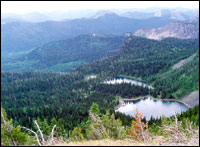Many political observers thought President Bush would lay off the environment during the election season. After all, he faces an opponent with a well-burnished rep as an environmental good boy.
Seems they’ve misunderestimated Dubya yet again.

Ann Veneman.
Photo: USDA.
On Monday, Agriculture Secretary Ann Veneman announced a Bush administration plan to scrap the hard-won Clinton-era “roadless rule” — a move that Phil Clapp, president of National Environmental Trust, ranks as “one of the top five biggest attacks on the environment since the Bush administration set foot in the White House, not to mention the single biggest giveaway to the timber industry in the history of the national forests.”
The roadless rule, implemented in the final month of the Clinton administration, protects the last remaining untouched wilderness in the American national-forest system — roughly 60 million of the 190 million acres of national forest — from mining, drilling, and development. It preserves fish and wildlife habitat and vital watersheds for drinking water. The rule was developed via a process that lasted more than a year, included 600 public meetings, and drew a staggering 2.2 million public comments, more than 90 percent of which were favorable.
“We produced the most popular environmental initiative in recorded history,” said Jim Furnish, who oversaw the rule’s development as deputy chief of the U.S. Forest Service under Clinton. “But it’s been on the Bush administration’s hit list from Day One.”
Indeed, the rule was among the dozens of Clinton administration initiatives frozen by the White House on Bush’s first day in office. Some three and a half months later, after much protest from the rule’s supporters, it was unfrozen with a public promise by Veneman to implement it scrupulously.
But as soon as the timber industry and governors from timber-producing states began to launch lawsuits against the rule, “the Bush administration just rolled over and played dead,” said Sean Cosgrove, national forest policy specialist at the Sierra Club.
Of the nine lawsuits filed so far, not a single one has been appealed by the Bush administration. When an Idaho judge issued a temporary injunction on the rule, it was left to The Wilderness Society, the Natural Resources Defense Council, and other environmental groups to appeal to the U.S. Ninth Circuit Court of Appeals — an appeal that proved successful. When, more recently, a Wyoming judge issued a permanent injunction, the Bush administration not only refused to appeal but tried to prohibit enviros from doing so. Despite these efforts, the 10th Circuit Court recently accepted The Wilderness Society’s appeal.
According to Agriculture Department spokesperson Julie Quick, “The lawsuits have raised all kinds of questions about the constitutionality of the roadless rule, which we believe is at odds with [the National Environmental Policy Act] and the Wilderness Act.”
Furnish doesn’t buy that. “It’s patently ridiculous to assume there is any conflict with [these laws] — we went to every possible length to be sure that there was no conflict,” he told Muckraker.
In trying to wriggle around the rule, the Bush administration initially trotted out the old logic that it’s the states, not the feds, that should decide how to manage America’s natural resources, and tried to exempt individual states like Alaska from protections.

Roadless is more: Montana’s roadless Ten Lakes Scenic Area.
Photo: USFS.
“We fully expected Veneman to try and rewrite the rule by creating more loopholes for states across the board to opt out,” said Michael Francis, director of the national-forests program at The Wilderness Society. “But we never thought that she would go so far as to do open-heart surgery on this rule and rip its guts out! All that’s left now is the name.”
Well, almost. There’s also a provision that would allow ecologically minded governors to petition for the roadless rule to be implemented on a state level — though the petition process would be costly and complicated, and would by no means guarantee approval by the Forest Service.
But few governors in states with big tracts of national forest have much incentive to seal off their public lands from development. “Simply put, governors have a big financial interest in increasing timber development in their states because it boosts their revenues both in terms of income taxes and corporate taxes,” Clapp told Muckraker. He points out that fully 97 percent of roadless national-forest tracts are located in just 12 Western states. It’s no surprise, then, that the timber industry has recently contributed heavily to the campaigns of governors in these states.
It’s also no coincidence that most of the states that stand to benefit economically from this rollback are either red states or swing states — Colorado, Oregon, Montana, and Wyoming, to name a few.
There is, however, a possible speed bump on Bush’s road to more roads: These states are home to strong hunting and angling communities — traditionally Republican demographics that are deeply opposed to weakening the rule. Last year, some 450 gun clubs submitted a petition to the Bush administration angrily opposing its efforts to exempt the Tongass National Forest in Alaska from roadless-rule protection.
“The Bush admin is calculating that the loggers, hunters, and anglers in these states are going to vote their paychecks and pocketbooks,” said Clapp. “They’re going to eat up the [Bush] argument that this [rollback] will promote job growth and boost state revenues.”
But Steve Moyer, vice president of government affairs at Trout Unlimited, a nonpartisan group thought to have a largely conservative membership, suggests this may be a miscalculation: “We’re very surprised that the Bush administration has decided yet again to act against the interest of American sportsmen and women,” he told Muckraker. “The Bush administration has already established a long pattern of actions that have angered our constituency, but this may be the most concerning bellwether. It poses major risks to the areas we hunt and fish, and you can bet our members will not be happy to find out about it.”
Just how strongly those sportsfolks and other wilderness lovers feel may become clear during the 60-day public comment period on Bush’s plan that begins this week. Or on November 2.

